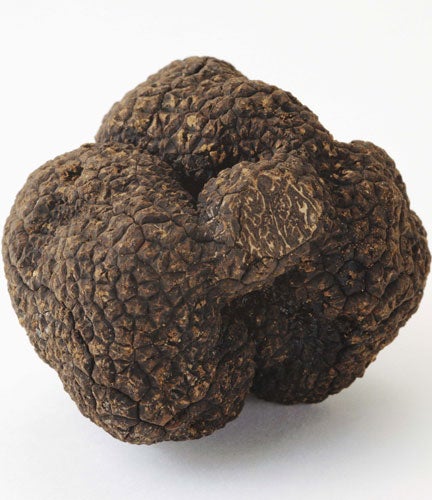Gastronomic alchemy: can black truffle be cloned?

France is turning to the test tube to try to uncover the mysteries of the black truffle to rescue one of the most important, and expensive, ingredients of French haute cuisine from global warming.
The departément of Corrèze has launched an initiative to clone the prestigious Pèrigord black truffle, also known as the "black diamond", which can sell for up to €1,000 (£867) a kilo.
Scientists plan to culture cloned truffles along with tree saplings in test tubes to try to reduce the uncertainties which surround "artificial" or farmed production of the little-understood underground mushrooms. Wild truffles are almost impossible to get in France. Artificial truffle production in the soil beneath groves of host trees has always been tricky and has been devastated by a series of hot summers and dry winters.
The project will be undertaken with Delpeyrat, a company which specialises in truffle conserves, and STEF-TFE, a food transport company. By identifying whether soil, climate or tree, or a combination of all three, is the key to the growth of truffles, the researchers hope to produce a more consistent crop.
Hervé Corvès, manager of the fruits and vegetables department of the Corrèze chamber of agriculture, said: "If we don't find new production methods the French truffle industry will not survive the century."
The plans were received cautiously by diners and chefs in Parisian restaurants, with many finding the idea of cloned truffles "quite off-putting". But the prospect of cheaper truffle dishes and year-round availability did interest certain chefs, as long as the quality remained the same, a sentiment echoed by Jacques Pebeyre, France's "truffle king". He said: "I am not against helping nature, but we need to know how good these truffles will be."
Truffle production, mostly between mid December and late March, has shrunk dramatically. The 2007-08 crop of Pèrigord truffles in Lalbenque, a village in Quercy where the truffle season began on Tuesday, was one-and-a-half tonnes. Maurice Courpet, an expert from Lalbenque, reckons this year's crop is likely to be only one tonne.
Truffle production in France is now about 50 tonnes a year, a huge drop since the beginning of the 20th century when production reached 1,000 tonnes a year. Many reasons have been advanced for the decline, including the spread of dense forests with the retreat of agriculture, over-use of chemicals in farming and, above all, climate change.
This week in Lalbenque, the few black truffles were selling for about €300 per kilo. The 2007 season began with black truffles selling for €250 a kilo, rising later in the season to almost €1,000.
Join our commenting forum
Join thought-provoking conversations, follow other Independent readers and see their replies
Comments